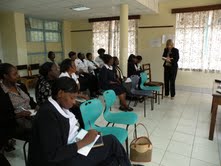Kenya Reaches Milestones in Post-rape Care
When the Government of Kenya passed the Sexual Offences Act of 2006, members of Parliament probably had no idea how important this landmark legislation was or how cumbersome it would be to sort out. The Sexual Offences Act (SOA) is a law that encompasses over 200 sex-related crimes ranging from gang rape to forced kissing. Prior to the passage of the SOA many of these crimes went without criminal investigation or punishment of the offender. An outcome of the SOA was the formation of a Sexual Offences Act Task Force, a multidisciplinary board chaired by a judge and comprised of representatives of government ministries and some members of civil society. When problems arise within the scope of the SOA it indeed takes a village to find solutions. Such issues are brought forward to the SOA Task Force.
Historically, a major problem with clinical, post rape care was that only one doctor in the country was authorized to conduct post rape examinations in Kenya. Survivors of violence would sometimes wait in queues for days to be seen by this doctor. This untimeliness would result in physical evidence being lost or destroyed and any bodily injuries would be healed before the patient was examined. Worse, the doctor was expected by law enforcement to determine whether a crime of rape or defilement had occurred. In reality, it is not the duty of a doctor to determine if a crime has happened. Rather, it is the duty of the police to investigate violations of the law. The Kenyan people have been misled for decades to believe that a doctor could formulate a “diagnosis” of rape while rape is not a medical diagnosis. Rape is a crime that warrants police investigation.




